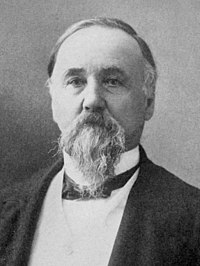
Summary
John Beatty (December 16, 1828 – December 21, 1914) was an American banker and statesman from Sandusky, Ohio. He served as a brigadier general in the Union Army during the American Civil War.
John Beatty | |
|---|---|
 | |
| Member of the U.S. House of Representatives from Ohio's 8th district | |
| In office February 5, 1868 – March 3, 1873 | |
| Preceded by | Cornelius S. Hamilton |
| Succeeded by | William Lawrence |
| Personal details | |
| Born | December 16, 1828 Sandusky, Ohio |
| Died | December 21, 1914 (aged 86) Columbus, Ohio |
| Resting place | Oakland Cemetery, Sandusky, Ohio |
| Political party | Republican |
| Profession | Politician, banker |
| Signature |  |
| Military service | |
| Allegiance | United States of America |
| Branch/service | United States Army Union Army |
| Years of service | 1861-1864 |
| Rank | |
| Unit | 3rd Ohio Infantry |
Biography edit
Beatty was born near Sandusky, Ohio. He entered the banking business in Morrow County.[1] Presidential elector for Lincoln/Hamlin in 1860[2] and in 1884.[3]
When the Civil War started Beatty volunteered as a private in the 3rd Ohio Infantry, serving in western Virginia. By 1863, he was commissioned as a brigadier general following his distinguished service in the Battle of Perryville, the Battle of Stones River, and the Tullahoma Campaign. He took command of a brigade of infantry and led it through the rest of the war. Beatty participated in the Tullahoma Campaign, the Battle of Chickamauga, and the successful Union attack on Missionary Ridge during the Chattanooga Campaign.[1] He resigned his commission in January 1864 and re-entered the banking business.
Following the war, he represented Ohio in the U.S. Congress from 1868 to 1873.
He served as a presidential elector in 1884 for the Blaine/Logan ticket.[4]
A 1909 biographer wrote that Beatty "is the sole survivor of the electoral college of Ohio, which cast its vote for Abraham Lincoln in 1860, and as far as known, the only surviving elector who cast a vote for President Lincoln when he was chosen to his first term almost a half century ago."[5]
Beatty was buried in Oakland Cemetery in Sandusky.
Autobiography edit
Beatty wrote The citizen-soldier, or, Memoirs of a volunteer, Cincinnati : Wilstach, Baldwin, 1879. The book has been reprinted more than once.[1]
Prior to the Civil War, John Beatty was a banker.
Yet like many others, North & South,
swiftly demonstrated a capacity for war.— Dave Powell[6]
See also edit
Notes edit
- ^ a b c Beatty, John, The Citizen Soldier, Time-Life Books reprint of 1879 edition. Reprinted in 2007 by Gardners Books. ISBN 978-1-4065-3698-0, ISBN 1-4065-3698-9
- ^ Smith, Joseph P, ed. (1898). History of the Republican Party in Ohio. Vol. I. Chicago: the Lewis Publishing Company. p. 124.
- ^ "Index to Politicians: Beatty to Beatty-smith". The Political Graveyard. Retrieved August 19, 2022.
- ^ Taylor 1899 : vol. 2, 106
- ^ Taylor, William Alexander (1909). Centennial history of Columbus and Franklin County, Ohio. Vol. 1. Chicago: S J Clarke Publishing Company. p. 458. ISBN 9780832828300.
- ^ Powell, Dave, Citizen Soldier: John Beatty and his Brigade at Chickamunga, North & South - The Official Magazine of the Civil War Society, Volume 10, Number 1, Page 58.
- Attribution
- This article incorporates public domain material from the Biographical Directory of the United States Congress
References edit
- Reid, Whitelaw (1895). "John Beatty". Ohio in the War Her Statesmen Generals and Soldiers. Vol. 1. Cincinnati: The Robert Clarke Company. pp. 924–926.
- Taylor, William Alexander; Taylor, Aubrey Clarence (1899). Ohio statesmen and annals of progress: from the year 1788 to the year 1900 ... Vol. 2. State of Ohio. p. 106.
- United States Congress. "John Beatty (id: B000283)". Biographical Directory of the United States Congress. Retrieved on 2008-02-12
- Wilson, J. G.; Fiske, J., eds. (1900). . Appletons' Cyclopædia of American Biography. New York: D. Appleton.
External links edit
- Works by John Beatty at Project Gutenberg
- The Citizen-Soldier by John Beatty at Project Gutenberg
- Works by or about John Beatty at Internet Archive
- "John Beatty". Find a Grave. Retrieved February 12, 2008.


